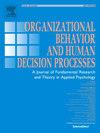The power and peril of first offers in negotiations: a conceptual, meta-analytic, and experimental synthesis
IF 3.8
2区 管理学
Q2 MANAGEMENT
Organizational Behavior and Human Decision Processes
Pub Date : 2025-09-19
DOI:10.1016/j.obhdp.2025.104448
引用次数: 0
Abstract
Is it advantageous to make the first offer and to do so ambitiously? Although initial studies suggested clear advantages across cultures and contexts, recent findings have challenged the robustness of this first-mover advantage. A preregistered meta-analysis of 374 effects from 90 studies (Study 1; N = 16,334) revealed three beneficial effects of making the first offer: (a) a general first-mover advantage (g = 0.42, m = 80), (b) a positive correlation between first-offer magnitude and agreement value (r = 0.62, g = 1.56, m = 53), and (c) an advantage of ambitious (vs. moderate) first offers on agreement value (g = 1.14, m = 187). The meta-analysis also identified two detrimental outcomes of ambitious first offers: (d) fewer deals (i.e., more impasses; g = −0.42, m = 13) and (e) worse subjective value experienced by recipients (g = −0.40, m = 41). Two preregistered experiments (Study 2a-2b; N = 2,121) replicated both the beneficial and detrimental meta-analytic effects and simultaneously tested multiple psychological mechanisms driving these effects. Across the experiments, selective accessibility drove the effect of first-offer magnitude on counteroffers, while anger drove the effects on impasses and subjective value. Across both the meta-analysis and the experiments, negotiation complexity moderated both the beneficial and detrimental effects of first offers; as the number and type of issues (i.e., complexity) increased, the effects of first offers became smaller, and the mechanisms changed. Overall, the current meta-analysis and experiments collectively illuminate the direction, size, psychological pathways, and boundaries of first-offer effects in negotiations.
谈判中先出价的力量和危险:概念、元分析和实验综合
提出第一个条件并雄心勃勃地这样做是否有利?虽然最初的研究表明了跨文化和背景的明显优势,但最近的研究结果对这种先发优势的稳健性提出了挑战。一项对来自90项研究的374个效应进行的预注册meta分析(研究1,N = 16,334)揭示了首次出价的三个有益效应:(A)一般的先发优势(g = 0.42, m = 80), (b)首次出价的大小与协议值之间的正相关(r = 0.62, g = 1.56, m = 53),以及(c)雄心勃勃(相对于温和)的首次出价对协议值的优势(g = 1.14, m = 187)。元分析还发现了雄心勃勃的首次报价的两个不利结果:(d)交易减少(即更多的僵局;g = - 0.42, m = 13)和(e)接受者的主观价值体验更差(g = - 0.40, m = 41)。两个预先注册的实验(研究2a-2b; N = 2,121)重复了有益和有害的meta分析效应,同时测试了驱动这些效应的多种心理机制。在实验中,选择性可及性影响了首次出价大小对还价的影响,而愤怒影响了僵局和主观价值的影响。在meta分析和实验中,谈判复杂性既缓和了首次报价的有利影响,也缓和了首次报价的不利影响;随着问题的数量和类型(即复杂性)的增加,首次报价的影响变得越来越小,机制也发生了变化。总的来说,目前的荟萃分析和实验共同阐明了谈判中首次报价效应的方向、大小、心理途径和边界。
本文章由计算机程序翻译,如有差异,请以英文原文为准。
求助全文
约1分钟内获得全文
求助全文
来源期刊
CiteScore
8.90
自引率
4.30%
发文量
68
期刊介绍:
Organizational Behavior and Human Decision Processes publishes fundamental research in organizational behavior, organizational psychology, and human cognition, judgment, and decision-making. The journal features articles that present original empirical research, theory development, meta-analysis, and methodological advancements relevant to the substantive domains served by the journal. Topics covered by the journal include perception, cognition, judgment, attitudes, emotion, well-being, motivation, choice, and performance. We are interested in articles that investigate these topics as they pertain to individuals, dyads, groups, and other social collectives. For each topic, we place a premium on articles that make fundamental and substantial contributions to understanding psychological processes relevant to human attitudes, cognitions, and behavior in organizations. In order to be considered for publication in OBHDP a manuscript has to include the following: 1.Demonstrate an interesting behavioral/psychological phenomenon 2.Make a significant theoretical and empirical contribution to the existing literature 3.Identify and test the underlying psychological mechanism for the newly discovered behavioral/psychological phenomenon 4.Have practical implications in organizational context

 求助内容:
求助内容: 应助结果提醒方式:
应助结果提醒方式:


